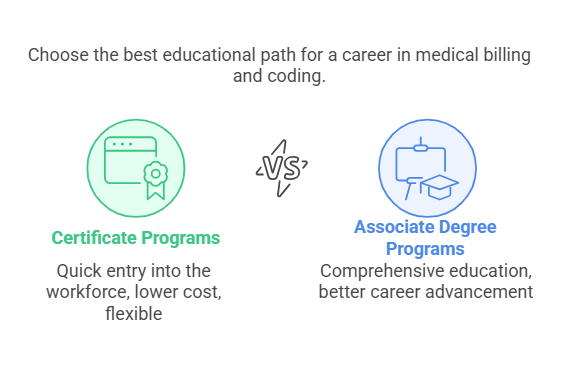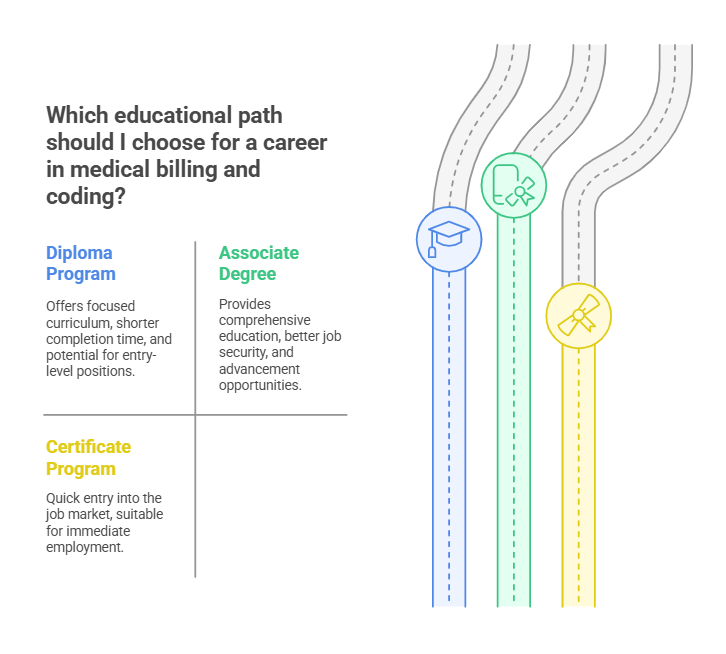Medical Billing and Coding Associate Degree vs Certificate: Which is Best for You?
When considering a career in medical billing and coding, one of the most important decisions is whether to pursue an associate degree or a certificate. This article compares both educational pathways, outlining their benefits, drawbacks, and how they align with career goals. By understanding the essential differences between the two, you can make an informed decision about which path is right for you.
Essential Takeaways for Medical Billing and Coding Programs
Certificate programs in medical billing and coding certification, like those offered by AMBCI, provide a quick and cost-effective entry point into the healthcare industry. These programs focus on providing the essential skills needed for entry-level positions, allowing students to start working sooner than those pursuing an associate degree. On the other hand, associate degree programs provide a more comprehensive education. They include general education courses alongside specialized training in medical billing and coding, which can help improve job prospects and career advancement in the healthcare field.
The choice between a certificate and an associate degree depends on individual career goals, time commitment, and financial considerations. Each pathway offers distinct opportunities, and understanding their differences can help you determine which one is best suited for your future.
Understanding Medical Billing and Coding
Medical billing and coding professionals are essential in the healthcare industry. They are responsible for converting medical procedures and diagnoses into codes that can be used for billing purposes and insurance claims. This role requires a strong understanding of medical terminology, coding systems like ICD-10 and CPT, and healthcare regulations. As healthcare continues to grow, the demand for skilled medical billers and coders remains high.
Professionals in this field help ensure accurate reimbursement for healthcare providers and maintain compliance with laws and regulations. Their expertise is critical to the financial health of medical practices and hospitals.
Medical Terminology and Coding Fundamentals
Mastering medical terminology and coding systems is a crucial part of training in medical billing and coding. Medical terminology refers to the specialized language used to describe medical conditions, treatments, and procedures. Having a strong grasp of this language is vital for correctly assigning codes to diagnoses and procedures.
In addition to terminology, coding systems like ICD-10 and CPT are essential for translating medical information into billable codes. Coding guidelines and the use of coding software are also fundamental skills that students learn in both certificate and associate degree programs. This knowledge helps students navigate the complexities of healthcare documentation and billing processes.
Certificate Programs in Medical Billing and Coding
Certificate programs in medical billing and coding are designed to equip students with the basic skills needed to enter the healthcare industry quickly. These programs typically focus on the key aspects of the job, such as medical terminology, coding systems, and billing procedures. Certificate programs are attractive to those who want to start working as soon as possible, offering a quicker, more affordable path compared to associate degree programs.
The benefits of certificate programs include shorter durations (usually a few months to a year), lower costs, and flexibility, especially with online options. However, certificate programs are more focused and don’t cover general education subjects like an associate degree would. This narrow focus can limit career advancement opportunities, as some employers may prefer candidates with more comprehensive education and training.
Associate Degree in Medical Billing and Coding
An associate degree in medical billing and coding typically requires two years of study and includes a broader curriculum. Along with specialized courses in medical billing and coding, students are required to take general education courses in subjects like English, mathematics, and social sciences. This well-rounded education helps students develop critical thinking, communication, and problem-solving skills, which are valuable in healthcare roles.
The benefits of an associate degree include a more in-depth education and better long-term career prospects. The program provides more extensive training and practical experience, including internships, which can make graduates more competitive in the job market. Additionally, associate degree holders are more likely to qualify for higher-level positions, such as coding supervisors or healthcare managers, offering opportunities for career growth.
Diploma Program vs. Associate Degree: Key Differences
While both diploma and associate degree programs provide training in medical billing and coding, they differ in their scope and depth. Diploma programs offer a more focused curriculum than associate degrees but still include additional training beyond certificate programs. Diploma programs typically take less time to complete than an associate degree but provide more comprehensive education than a certificate.
Career Opportunities and Job Market
The job market for medical billers and coders remains strong, and both certificate and associate degree holders can find employment. However, those with an associate degree may have an advantage in securing more advanced roles. Entry-level positions include roles such as medical receptionists, office assistants, and claims processors, while more experienced professionals may move into roles like coding supervisors and healthcare managers.
Employers generally prefer candidates with higher education levels, and associate degree holders often have better job security and career advancement opportunities.
Salary Expectations
Salaries for medical billers and coders vary based on experience, location, and education. Here are some average salary ranges for different positions in the field:
Medical Biller: $35,000 - $50,000 per year
Medical Coder: $40,000 - $60,000 per year
Certified Coding Associate: $50,000 - $70,000 per year
Earning an associate degree or diploma can significantly increase salary expectations by opening doors to more advanced roles and higher-paying positions.
Certification and Professional Development
Certification is a key element of success in the medical billing and coding field. Credentials such as the Certified Coding Associate (CCA) can enhance job prospects and demonstrate a commitment to the profession. Continuing education is also essential to stay current with evolving healthcare regulations and coding systems.
Choosing the Right Path for Your Career Goals
The decision between a certificate and an associate degree depends on your career goals, financial situation, and time commitment. If you aim to enter the job market quickly, a certificate program may be the right choice. However, if you're looking for a more comprehensive education with better long-term career growth potential, an associate degree might be the better option.
Six Lesser-Known Facts About Medical Billing and Coding
Projected Growth in Demand: The U.S. Bureau of Labor Statistics projects a 9% growth in employment for medical records and health information specialists, including medical billers and coders, from 2021 to 2031, which is faster than the average for all occupations. Research.com
Uses of Medical Coding: Medical coding is essential not only for insurance billing but also for tracking patient data and outcomes, which supports healthcare research and improves patient care. Research.com
Transition to ICD-11: The International Classification of Diseases, 11th Revision (ICD-11), is set to become the global standard for health data coding by 2025, replacing the previous ICD-10 system.
Impact of Certifications: Obtaining certifications such as Certified Professional Coder (CPC) or Certified Coding Specialist (CCS) can significantly boost earning potential, often leading to salaries 10-20% higher than those of non-certified peers. Research.com+1Research.com+1
Remote Work Opportunities: Medical billers and coders often have the flexibility to work remotely, especially within larger healthcare systems that manage substantial billing operations.
Importance of Accuracy: Coding errors can lead to delayed payments or insurance rejections, making accuracy and attention to detail critical in this field.
Frequently Asked Questions (FAQs)
-
Certificate programs are shorter, more affordable, and focused on specific skills, while associate degrees offer broader education, including general education courses, leading to more career advancement opportunities.
-
Certificate programs typically take a few months to a year, while associate degrees take about 18 months to two years.
-
Yes, both certificate and associate degree holders can find jobs in medical billing and coding, though associate degree holders may qualify for higher-level positions.
-
The CCA certification demonstrates proficiency in medical coding, enhancing job prospects and career growth opportunities.
-
Yes, you can pursue additional education, such as a bachelor's degree or specialized certifications, to further enhance your qualifications and career opportunities.




